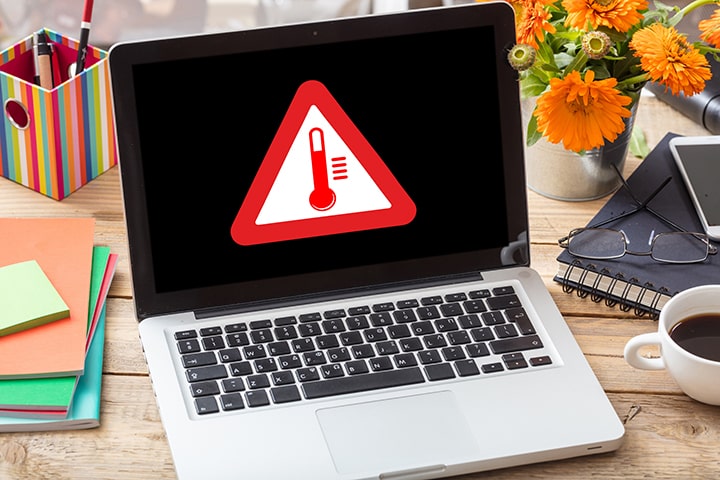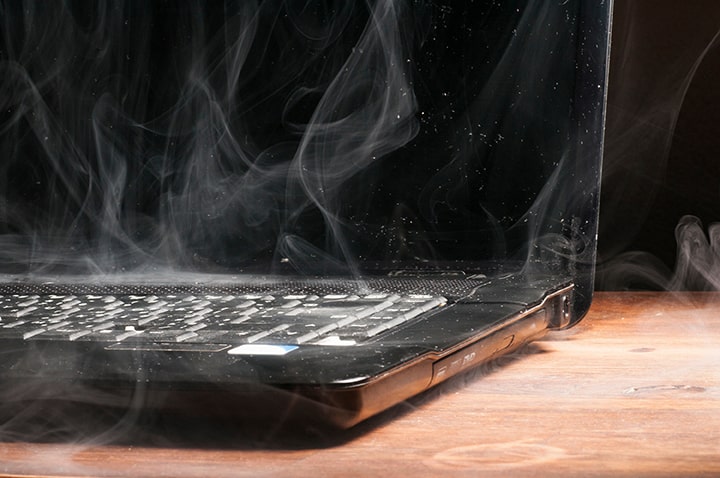What causes gadgets to overheat?
Are your gadgets feeling hot?
Hardworking gadgets may get hot from time to time when you use them for prolonged periods. Most have cooling mechanisms which are activated if they exceed their temperature limit.
If your gadget is overheating every now and then, it shouldn’t normally be a reason of concern. If you find that it’s doing this for no reason, there could be a wider issue.
What causes electronic devices to overheat?
 Usually, it’s the elements inside overworking which can lead them to exhaustion and then overheating.
Usually, it’s the elements inside overworking which can lead them to exhaustion and then overheating.
No gadget is built to last forever but that doesn’t mean that you should regularly push them to their breaking point. The days when laptops used to explode may be over (hopefully), but it’s still a good idea to take care of your gadgets.
In the highly unlikely event that your gadget did overheat completely, then there may be a small fire or a little smoke.
If that happens, try and remain calm. If it is safe to do so switch your device off at the mains, then extinguish the fire. If it spreads or you cannot put this out, dial 999 for the Fire & Rescue Service and make sure you alert anyone else in the house. Leave the room closing to the door behind you and wait outside for the emergency services.
Batteries are normally to blame, which will usually be lithium-ions. These are the leading battery type at the moment which power phones, tablets and our toothbrushes. They also have a record of causing fires when incorrectly disposed of. They are suspected to have caused around 250 fires at waste facilities between April 2019 – May 2020. Remember to take care when disposing of batteries, not to throw them in general waste but take them to a recycling point.
This is due to them being sensitive to high temperatures. The battery cells will inevitably deteriorate in time so you will notice them degrading naturally.
What is a thermal runaway?
Thermal runaway happens when the battery cell temperature rises suddenly and rapidly.
This leads to the complete destruction of the battery, and the gadget itself. In extreme cases, it can even cause fire.
Accidents like these are extremely rare, but there have been some high-profile cases which raised eyebrows. Take for example the 2006 incident at a press conference in Osaka, Japan. Attendants watched in fear as a Dell laptop kept igniting for more than five minutes.
Sony had to recall around 9.6 million lithium-ion batteries that they manufactured for Dell, and they also provided financial support for the damages.
Thermal runaway is the main reason that the laptops caught fire as the battery temperature rose to its maximum.
Images of burnt laptops soon took over the Internet. Some users reported cases of their laptops igniting as well, although only six cases had been officially confirmed.
The incident even raised concerns with Apple for the Sony-made batteries of 1.8 million iBooks and now discontinued PowerBook laptops.
This resulted in a product recall, with consumers asked to check their serial numbers to identify whether their laptops were included in that faulty batch and report back to the manufacturer.
A similar situation occurred with HP with models sold between December 2015 and April 2018 where HP had to recall around 78,500 laptops in various ProBook and Envy models, along with the x360 and the Notebook range. Due to a battery overheating and subsequent fire risk.
Thankfully due to the advances in technology, there is little likelihood that you’ll experience any lithium-ion battery “explosions” anytime soon, or ever.
How to prevent a thermal runaway
When batteries produce more heat than they can handle, they get burnt out. Sometimes this can happen due to manufacturing defects and design flaws but not always.
There are quite a few things you can do as a user to prolong your devices’ life:
- Don't overuse your gadgets
Imagine if you were exercising for hours and hours without any breaks. Your body would probably collapse! Overworked gadgets would have to endure a similar impact.
- Avoid overcharging your mobile phone or laptop.
There is no need to leave your gadgets charging all night. Most new laptops and smartphones have quick charging cycles, so you can usually have a fully charged device in less than an hour.
Out and about and your gadget is running low? You can carry a power bank with you to give your phone a quick boost. There are also many places you can find charging ports, such as on buses, trains, in airports, hospitals, even some restaurants and cafes have them. - Don’t store your gadgets in rooms with a very high temperature
If you feel too hot in an area inside the house, your gadget probably does too. Take your gadget somewhere cooler and try not to use it for a little while, to help it cool down quickly.
- Don’t tamper with your gadgets.
Any unauthorised repairs using low quality battery components or replacing the gadgets’ ‘native’ battery completely is a big no.
If your battery does seem to be loosing it’s charge or overheating quickly, then consider going back to the manufacturer to fix this. Also, if you have insurance, you may be covered for this type of breakdown.
- Take a break from gaming or reduce your gaming sessions.
Don’t overkill that processor. Long gaming sessions will exhaust your RAM eventually more than anything else you do on your device.
- Consider reducing the amount you spend streaming – whether its music, TV or films.
Similar to gaming, streaming puts the phone or laptop’s processors at more work as they have to load data. It also has to keep the display on while you’re watching.
- Watch out for any outdated operating systems and apps.
It’s common for older operating system versions and apps to develop bugs and errors.
Software and app updates are necessary to remove them. If you can't remember the last time you updated them, check to see if there are newer versions and update them asap.
- Don’t fry your gadgets in the sun.
Direct sunlight can damage their elements, especially the battery if it gets too hot.
If you live in a hot climate or your home easily gets warm, you should store your gadgets in a cool area.
- Replace your battery.
An already deteriorated battery could lead to a thermal runaway. If your battery is aging and draining fast, your processor would have the lovely task of keeping the gadget running for as long as the battery can take.
Apple usually notifies you when the battery performance drops significantly so you can service it before it dies.
- Get rid of dynamic wallpapers and widgets.
You probably won’t be staring at your wallpaper long enough to watch pictures moving.
A static picture can be just as pleasing to look at and could also save battery life. By lifting some of the burden for your processor as it won’t have to load the moving images every time.
Widgets are like desktop shortcuts. They provide a quick way of accessing an app/page without having to open the app/page itself.
This would again add more unnecessary burden for the processor and the battery. If you have to tap/click an extra button to help your processor, then do so.
Don't let your laptop lose its cool
 If your laptop feels like it’s ‘burning’, don’t push its luck. Shut it down and give it some rest. Don’t put it to sleep or on hibernate mode as the processor will still be active.
If your laptop feels like it’s ‘burning’, don’t push its luck. Shut it down and give it some rest. Don’t put it to sleep or on hibernate mode as the processor will still be active.
Likewise, if your phone feels like it’s getting worked up, leave it alone for a bit. If you don’t expect any important phone calls or texts on a specific day, shut it down.
How can I stop my phone/laptop from overheating?
Before concluding that your gadgets are systematically overheating, give them a test to see if that’s indeed the case.
Try some (or all) of the tips provided above and see if there’s any positive change in behaviour.
If your battery needs servicing, book an appointment to get it replaced. Even better, contact your gadget insurer, if your device is insured.
Has my phone/laptop been hacked?
Hacking has been linked to gadgets overheating as there’s an extra (unauthorised) user on that device.
Hackers can watch your activities quietly in the background without you realising it. Sometimes they can even install their own apps and fill up your storage with extra data that you are unaware of. Read on to find out how to tell if your phone has been hacked, and what to do.
We doubt that your phone or laptop will ever erupt in flames. If you are worried about your battery weakening as your gadget gets older, consider trying some of our tips above.
Protecting your gadgets from breakdown, damage and more could help reduce costs, should the worst happen, and your device needs to be repaired or replaced.
Worried about the lifespan of your battery? Consider protecting your gadget from breakdown, to help bring peace of mind
Protect your gadgets instantly